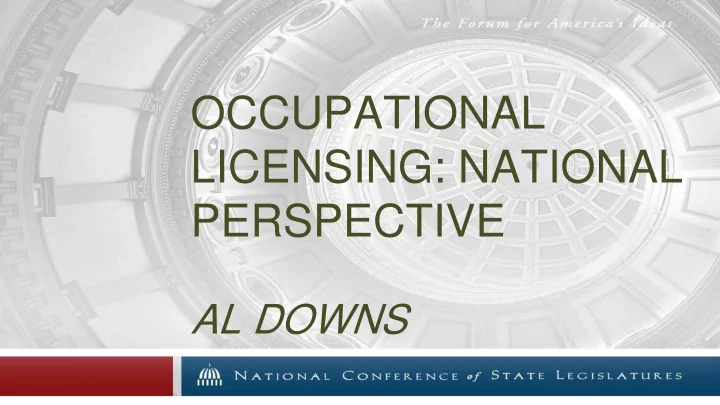

OCCUPATIONAL LICENSING: NATIONAL PERSPECTIVE AL DOWNS
Why ease burdens? In some cases, licensing has been shown to increase unemployment ⬜ Gius (2016) found licensing of veterinary technicians, teacher’s assistants, taxi drivers, pharmacy technicians, opticians and some construction workers was significantly related to fewer per capita jobs Variation in requirements across state lines impedes labor fluidity ⬜ Kleiner (2015) Technologic and market evolution can leave established standards outmoded
Independent Approaches Sunrise/Sunset procedures ⬜ Data-driven decisions Streamline ⬜ Centralize and digitize Altering requirements ⬜ Lower, exempt, delicense
Sunrise/Sunset: Theory and Mechanics At the federal level, regulatory bodies have been required by every President since Jimmy Carter to review the cost and benefits of regulatory alternatives before issuing rules ⬜ Also required in many states, for licensing and other rulemaking Ex-ante or “lookback” regulatory impact analysis can improve enforcement, expand public input, and reduce mission creep When and by whom reviews are executed matters ⬜ Independent agency or commission, self-review, legislative body
Sunrise/Sunset: In Practice Washington Sunrise Act of 1986 Texas Sunset Act of 1977 “The legislature's intent is that all “The Sunset Advisory Commission reviews all agencies scheduled for termination in a individuals should be permitted to enter particular year by gathering self-evaluation into a business profession unless there reports from the agencies, conducting public is an overwhelming need for the state to hearings, and preparing reports to the protect the interests of the public by legislature with recommendations to restricting entry. In addition, changes of continue or abolish the agencies. If the existing licensed practitioner's scope of commission recommends continuing an practice should benefit the public. agency, it must also provide draft legislation Enhancement of professional status that…corrects any problems identified alone is not justification for regulation.” during the review.”
Streamlining: Theory and Mechanics Reducing time burden while maintaining same regulatory requirements ⬜ Moving systems online, “one stop” licensing, intrastate reciprocity Most streamlining activity can be done administratively Centralization of licensing is exception and generally requires legislation
Streamlining: In Practice Maryland SB 262 - 2017 Kansas Board of Pharmacy - eLicensing “Requiring a county health “[The] web-enabled department to issue a mobile reciprocity license…prohibiting a licensing and renewal county from requiring that a mobile food service facility be inspected system will improve before a county health department issues a mobile reciprocity license if Board experience, ease the mobile food service facility has of access, and renewal been inspected by the county of origin.” process.”
Altering Requirements: Theory and Mechanics Following Sunrise/Sunset review, existing requirements may be found to exceed necessary levels to achieve policy goals ⬜ Changing demographics, technology Alternative mechanisms for demonstrating qualifications to the state may arise or become newly recognized ⬜ Military training, virtual classrooms, lateral recognition Occupations and professions found to put the public at limited risk relative to the labor market burden of licensing can be delicensed ⬜ State certification or consolidation
Altering Requirements: In Practice Ohio HB 189 - 2017 Nebraska LB 140e - 2017 Eliminate high school education req. for Eliminated mandatory boutique services providers Convert the natural hair stylist and licensing for independent contractor license to registry Allow distance education to be used to meet commercial banking education and continuing education requirements and credit union loan Reduce required hours of instruction for a cosmetology license from 1,500 to 1,000 officers
Anti-Trust Concerns In North Carolina State Board of Dental Examiners v. FTC , the U.S. Supreme Court held that if the majority of state occupational licensing board members are active market participants, the licensing board is subject to federal antitrust laws. Since this ruling, state authority to regulate via occupational licensing has been limited by federal anti-trust laws. Why the Court ruled in this way and what can be done at the federal and state level to prevent future regulatory decisions from being illegally anti- competitive. The case has sparked action across states and has prompted further lawsuits against state boards in Texas and elsewhere.
Licensing: veterans and military spouses Governors and state legislatures have shown a commitment to easing transitions into employment for veterans and their spouses. Challenges for veterans: cost, applicability of training, and less than honorable discharge. Challenges for spouses: cost, interstate variation, vague language. Examples: Wisconsin Act 319, Utah SB 227
Licensing: individuals with criminal records Individuals with criminal records face many barriers to licensure including both those codified in federal and state law and those that are unwritten. Challenges for inviduals with criminal records: cost, blanket bans, “good moral character” clauses, and applicability of training. Examples: Illinois HB 5973, Utah HB 37
Limitations and challenges of independent reforms Personnel and budget constraints May not address interstate mobility ⬜ Could even undermine interstate agreements Political considerations
11-State Occupational Licensing Learning Consoritum Members: Arkansas, Colorado, Connecticut, Delaware, Illinois, Indiana, Kentucky, Maryland, Nevada, Utah, and Wisconsin. In-state meetings Conference
NCSL Resources Most recent report: The State of Occupational Licensing National Database Legislative Tracker Upcoming reports
Thank you Al Downs: albert.downs@ncsl.org
Recommend
More recommend